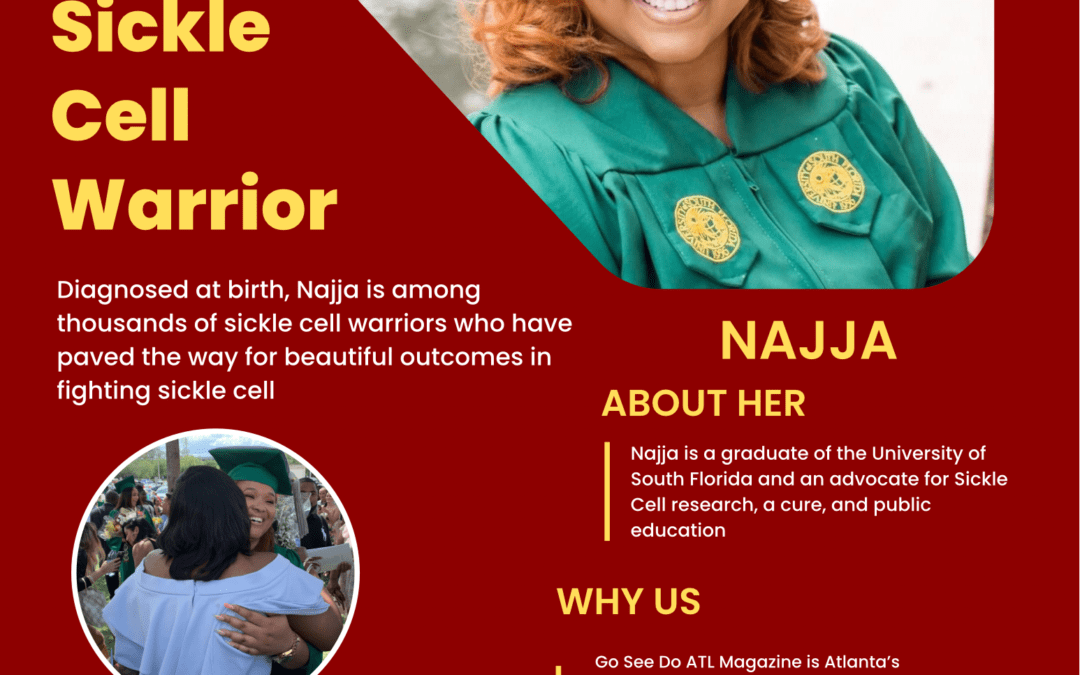Go See Do ATL, Atlanta’s premiere guide to Atlanta and the Airport Area, has partnered with Beautiful Nurses Magazine, a feel-good guide to health and wellness publication. Beautiful Nurses Magazine will feature a health and wellness segment in each edition that will be informative, life changing, and fun. Beautiful Nurses Magazine will highlight health interviews with guests that will help people explore healthy topics while they Go See Do ATL.
Beautiful Nurses Magazine interviewed for this health blog edition, Najja Taylor and her mother, Jamila, from Tampa, Florida, during their visit to Atlanta. Najja is a Sickle Cell Warrior who was diagnosed with Sickle Cell at birth. They both are fans of Go See Do ATL and beautiful Nurses Magazine.
Growing up Najja spent numerous weeks every year in the hospital with severe pain, along with frequent doctor visits. Najja graduated from high school with high honors and received a full scholarship to Jacksonville University. Unfortunately, sickle cell would nearly cost her life while attending Jacksonville University, and it was decided that she complete her education at the University of South Florida, near her home in Tampa, so that she could have family support, and access to her pediatric doctor, who still has a major impact in her adult care, Dr. Tebi, along with his team.
Najja completed her bachelor’s degree from the University of South Florida and currently works in the mental health field. Najja credits her parents, Antonio and Jamila, for her success and strength to slay sickle cell every day.
In order to understand the importance of sickle cell awareness, you must first understand what it is. Do you know?
What is sickle cell?
Sickle Cell is a rare hereditary disease that impacts fewer than 200,000 people in the United States each year. The sickle cell patient has red blood cells that are not normal. Their blood cells have a sickle shape, like a farm tool called the sickle, and these abnormal cells can become sticky, and the die early which leads to blood transfusion, lack of proper oxygenation in the body, and severe pain due to their sticky structure and inability to flow through the blood vessels because of their sickle shape too.
Is there just one type of sickle cell?
Absolutely not. There are several types of sickle cell disease. A medical provider called a hematologist will be able to confirm the type of sickle cell a patient has in their body.
Najja wants the healthcare community particularly to understand the importance of not stigmatizing sickle cell patients. Najja wants you to know that people with sickle cell are not to be afraid of, or to be labeled as charity. She wants more education, and research to be provided by the health community. Najja wants to make sure that these patients receive optimal care and not be judged, discriminated against, or made to feel that they are faking, or “seeking drugs”.
Najja’s mom, Jamila, agrees with her daughter’s sentiments, and encourages each of you to get involved with your local sickle cell community programs. Jamila recommends to parents, never allow anyone to look at your child as if they are less than, which often can happen because of people’s lack of knowledge. She encourages parents to keep their children with sickle cell on a healthy organized, and consistent schedule filled with,
- Lots of Hydration
- Plenty of Rest
- Monitoring and limiting strenuous activities
- Breastfeeding at birth up until mom desires to quit using her breast milk.
- Daily prayer and positive affirmations
- Keeping every scheduled doctor visit and being vigilant in asking questions about the care of their children at doctor visits, along with making sure the child mirrors positive parent interaction with providers so that they too can active role in their own personalized care
Unfortunately, as a nurse, I’ve often seen too many times the racial and untruth rumors of sickle cell patients. Oftentimes they are viewed as addicts because of their extreme need for pain medication, instead of the pain medication being a means to prophylactically and acutely being used to help them. I have on countless occasions had to counsel and educate other healthcare professionals.
Atlanta represents the 4th largest population in the nation for people with sickle cell disease. Over 14,000 people in Georgia represent those who have sickle cell. More than 100,000 suffer from sickle cell disease, which is a blood disorder condition. This condition is characterized by severe pain and severe organ damage. It disproportionately affects black people and people of color.
Visit www.beautifulnursesmagazine.com to read the full interview with Najja and her mother, Jamila. Join Beautiful Nurses Magazine in partnership with Go See Do ATL on Sunday, October 30th, a live virtual event in Atlanta, to bring awareness and education to the community regarding Sickle Cell. You will be able to ask Najja and her mom Jamila questions regarding sickle cell disease, along with other healthcare professionals on our health panel.
I’m Nurse Junia
Beautifully,

